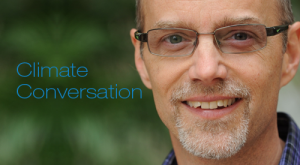An introduction to Climate Conversation
 As an environmentalist, I have a keen interest in the ongoing public conversation about climate change, but I have often been frustrated by the tone and substance of the conversation. Despite compelling evidence of the causes and impacts of climate change, progress in addressing this serious global issue has been slow.
As an environmentalist, I have a keen interest in the ongoing public conversation about climate change, but I have often been frustrated by the tone and substance of the conversation. Despite compelling evidence of the causes and impacts of climate change, progress in addressing this serious global issue has been slow.
While I am one who is predisposed, if not just able, to “connect the dots” among the disparate sources of information, others appear not to see mounting or compelling evidence of climate change, how it may be affecting their lives or livelihoods, or what steps might be taken to mitigate or adapt to such impacts. Why is that?
This blog is focused on exploring this question. It is about the nature and dynamics of the “climate conversation.” It is not intended to marshal the facts about climate change or provide tips on how to talk about climate change. Rather, I want to better understand the attitudes and perceptions that underlie the conversation, and how this conversation informs and is informed by scientific, political, religious, and other considerations.
This is a personal blog. I will be starting my own conversation with those closest to me, my family, friends, and colleagues from work, then branching out to query others, some of whom will and won’t have any apparent connection to climate issues.
Since I live in the Southwest, which is experiencing a prolonged drought and may be especially vulnerable to climate change, I will pay attention to how the conversation about climate is evolving in and around my home. I also hope to explore the conversation across the West, the nation, and globally.

John Shepard

Latest posts by John Shepard (see all)
- A climate conversation for the Colorado River basin - March 19, 2014
- Climate change and the current drought in the Southwest - March 17, 2014
- Climate change: a business risk we can’t ignore - February 6, 2014

You must be logged in to post a comment Login